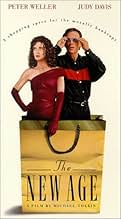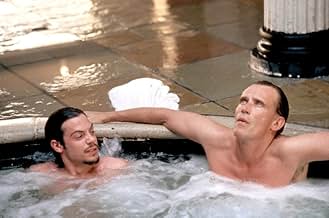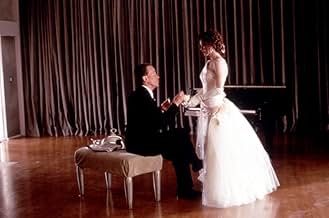IMDb RATING
5.6/10
1.4K
YOUR RATING
Episodic story about a yuppie couple who're going broke, and can't decide if they want to stay together - but openly sleep around and experiment with different lifestyles, or not.Episodic story about a yuppie couple who're going broke, and can't decide if they want to stay together - but openly sleep around and experiment with different lifestyles, or not.Episodic story about a yuppie couple who're going broke, and can't decide if they want to stay together - but openly sleep around and experiment with different lifestyles, or not.
- Awards
- 1 win total
- Director
- Writer
- All cast & crew
- Production, box office & more at IMDbPro
5.61.3K
1
2
3
4
5
6
7
8
9
10
Featured reviews
A film off the beaten path.
The response to this film was a little more negative than I expected. I liked the film better than Tolkin's "The Rapture." It's one of my favorites to watch for non-serious viewing.
The film has a quirkiness, even a spookiness, that, apparently, many dislike and don't understand. I wanted to recount the plot; however, since that's not desired, I don't see why other reviewers think the plot is so implausible.
Peter Weller's and Judy Davis' characters seem to be mismatched partners, but is that so implausible? This dissonance was probably intended, but disliked by many viewers. Anyway, the main characters compromise themselves in many ways: I think Peter and Judy do well in the movie.
I also like Adam West in his small part, and the under-rated Patrick Bachau plays his part as a new-age guru with urbane spookiness. Corbin Bernsen has a small part at the beginning as the boss for Peter Weller's character (Weller's character is conveniently named "Peter.")
Finally, I like the depictions of certain new-age ceremonies and personalities--this is rare in movies.... I think the movie is thoughtful. It does not have much action, but don't most action films today flagrantly violate the law of "suspension of disbelief?"
This film will not be liked by the multitude in America with the attention span of a gnat.
The film has a quirkiness, even a spookiness, that, apparently, many dislike and don't understand. I wanted to recount the plot; however, since that's not desired, I don't see why other reviewers think the plot is so implausible.
Peter Weller's and Judy Davis' characters seem to be mismatched partners, but is that so implausible? This dissonance was probably intended, but disliked by many viewers. Anyway, the main characters compromise themselves in many ways: I think Peter and Judy do well in the movie.
I also like Adam West in his small part, and the under-rated Patrick Bachau plays his part as a new-age guru with urbane spookiness. Corbin Bernsen has a small part at the beginning as the boss for Peter Weller's character (Weller's character is conveniently named "Peter.")
Finally, I like the depictions of certain new-age ceremonies and personalities--this is rare in movies.... I think the movie is thoughtful. It does not have much action, but don't most action films today flagrantly violate the law of "suspension of disbelief?"
This film will not be liked by the multitude in America with the attention span of a gnat.
Satire of Hollywood phonies itself comes off as a poser...
Writer-director Michael Tolkin, whose 1991 film "The Rapture" was one of the best films of its year, let his talents go to waste with this absurd comedy of lost morals. A graphic designer and her Hollywood honcho husband are in big financial trouble: she has no clients and he just quit his job. Some of their survival solutions are quirky and interesting, but the characters are off-base right from the start. Tolkin is the new Sidney Lumet: everyone screams irrationally at everyone else, but it's tough discerning whether or not we're supposed to laugh at these banal verbal matches, often from opposite ends of the swimming pool! The leads present another problem: Judy Davis and Peter Weller are brilliant actors, yet they can't work up any semblance of chemistry together as this high-powered married couple on a tightrope. A few of their marital predicaments are worked out amusingly (they separate within the house, and date others), but their jealousies and insecurities are a bore. Tolkin (also the screenwriter of "The Player") pretends to know these people (he's pseudo-hip). It would be to his ultimate advantage if he broadened his horizons...maybe it's time he left L. A. and make some new friends? *1/2 from ****
It bites!
This film was a complete surprise to me. It's clever, funny and very thought-provoking. Judy Davis and Peter Weller (that man is underrated) both deliver excellent performances. A warning: The ending isn't quite the usual happy salvation, but it really does hit the perfect note on one of the main themes of the film: You can't always get what you want. And pushing that very feeling to the viewer just before the credits is perhaps the cleverest thing about the whole film.
I LIKED IT!
Yes, The New Age is beguiling art film and not for everyone, but I enjoyed its take on the L.A. nouveau riche set. Peter Weller and the luscious Judy Davis are back again as a whacked out couple that are not unlike the pair they played in Cronenberg's Naked Lunch. I liked the look of the film, the off the wallness of it all, and its sly sense of humor. We need another reteaming of Weller and Davis for the new millenium, daddy-o. But if you like art movies about the rich bitch L.A. scene go see The New Age. Solid.
Well-paced drama, with a little dark humor.
I liked this film because it does a good job of making the viewer consider what is important in life, and why. On the other hand, it is not the most exciting movie ever made. I recommend this if you want a story to ponder that exposes modern values to criticism. I give it a 7/10.
Peter and Katherine are a typical couple of California yuppies. They want to be cool, the want to indulge themselves, they live lavishly on their credit cards, and they hold "spiritual values" above wealth and work. Unfortunately, when their careers go down the toilet during the recession in the early 1990s, they fall upon hard times. They try to start an independent business, but their easy and hedonistic lifestyle prevents them from putting in the blood, sweat, and tears that are required for success in retail. Their spiritual values are of no help when things get rough, because their "New Age" values are really just a justification for selfishness and egocentricity.
The movie is the story of their loss of innocence. To get their lives back on track, they have to work hard at jobs that simply are not cool. Their elitist attitudes must give way to sacrifice and common sense. It is not clear whether this is a triumph or a tragedy for Peter and Katherine. That is left up to the viewer in this one.
Peter and Katherine are a typical couple of California yuppies. They want to be cool, the want to indulge themselves, they live lavishly on their credit cards, and they hold "spiritual values" above wealth and work. Unfortunately, when their careers go down the toilet during the recession in the early 1990s, they fall upon hard times. They try to start an independent business, but their easy and hedonistic lifestyle prevents them from putting in the blood, sweat, and tears that are required for success in retail. Their spiritual values are of no help when things get rough, because their "New Age" values are really just a justification for selfishness and egocentricity.
The movie is the story of their loss of innocence. To get their lives back on track, they have to work hard at jobs that simply are not cool. Their elitist attitudes must give way to sacrifice and common sense. It is not clear whether this is a triumph or a tragedy for Peter and Katherine. That is left up to the viewer in this one.
Did you know
- TriviaWas #9 on Roger Ebert's list of the Best Films of 1994.
- Quotes
Peter Witner: Did you know that in Chinese the word for "crisis" is the same as the word for "opportunity"?
- ConnectionsFeatured in Siskel & Ebert: Why Gump? Why Now? (1994)
- How long is The New Age?Powered by Alexa
Details
Box office
- Gross US & Canada
- $245,217
- Opening weekend US & Canada
- $35,797
- Sep 18, 1994
- Gross worldwide
- $245,217
- Runtime
- 1h 52m(112 min)
- Sound mix
- Aspect ratio
- 1.85 : 1
Contribute to this page
Suggest an edit or add missing content









































